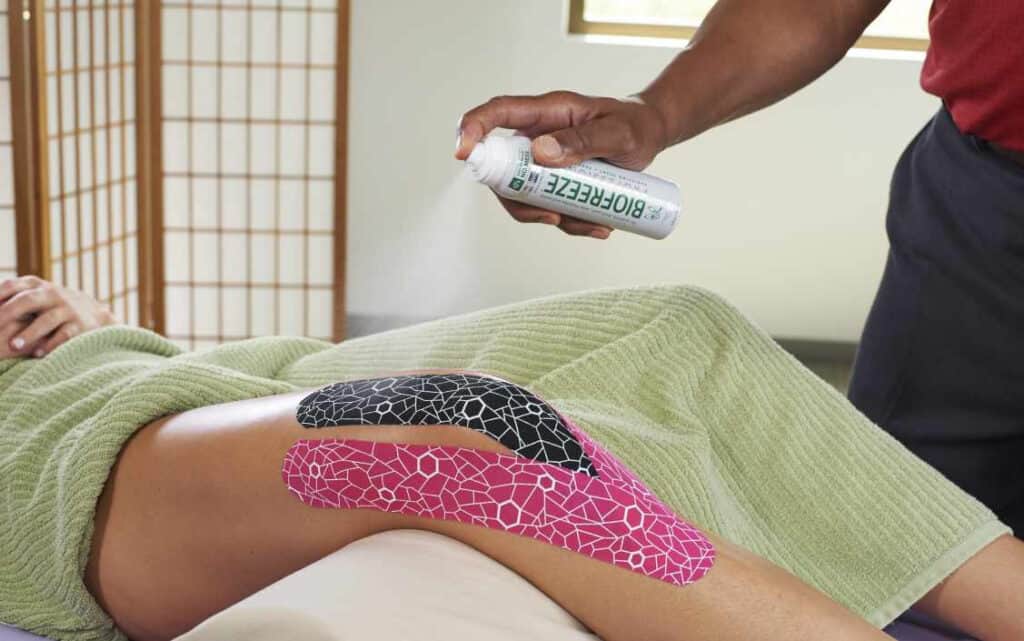-
CLINIC ADDRESSES 1300 SE 14th St #2, Bentonville, AR 72712

Who Should Not Use Biofreeze? Read Before Using It
Biofreeze is a commonly used topical gel designed to provide temporary relief from muscle soreness, joint pain, and arthritis discomfort. While it may offer short-term relief, not everyone should use this product. There are specific groups of people who should avoid using Biofreeze due to potential risks and side effects.
Who Should Avoid Biofreeze?
Get a Free Consultation Today
Your health shouldn’t wait. Fill out the form below and we’ll help you get started on your journey to living well.
Individuals with Sensitive Skin or Allergies
Biofreeze contains menthol, which can cause irritation for those with sensitive skin or certain allergies. If you have previously experienced allergic reactions to menthol-based products or similar topicals, it’s best to steer clear of Biofreeze. Symptoms of a reaction may include redness, itching, or swelling.
Children Under the Age of 12
Biofreeze is not recommended for use in children under 12 years old. Due to their more delicate skin, younger children may be more susceptible to irritation or adverse reactions.
Pregnant or Nursing Women
While research on the effects of Biofreeze during pregnancy or breastfeeding is limited, it’s generally advised that pregnant or nursing women avoid using it unless directed by a healthcare provider. The active ingredients could potentially be absorbed and pose a risk to the baby.
People with Open Wounds or Skin Conditions
Biofreeze should not be applied to open cuts, sores, or areas affected by skin conditions like eczema or psoriasis. The menthol may worsen irritation and delay the healing of damaged skin.
Patients with Nerve Disorders or Poor Circulation
Since Biofreeze works by creating a numbing, cooling effect, individuals with nerve disorders like neuropathy or conditions that impair circulation should avoid using it. These conditions could prevent you from feeling whether the gel is causing further irritation or harm.
Biofreeze: A Quick Fix, Not a Long-Term Solution
Although Biofreeze provides a cooling sensation and temporary relief from pain, it should only be used for short-term discomfort. Its effects wear off quickly, and it does not address the underlying causes of pain or inflammation. This makes it useful for occasional flare-ups but not ideal for those suffering from chronic pain.
For those dealing with long-lasting conditions like arthritis, joint pain, or soft tissue injuries, Biofreeze is simply a stopgap measure. At Arkansas Health and Aesthetics, we advocate for more sustainable solutions to pain and inflammation, such as regenerative medicine.

Regenerative Medicine: A Long-Term Solution for Pain and Inflammation for Those Who Should Not Use Biofreeze
Regenerative medicine is revolutionizing the way we treat chronic pain and injury. Treatments like platelet-rich plasma (PRP) therapy and cell-based therapies offer patients a path to healing by stimulating the body’s natural repair mechanisms. Unlike Biofreeze, which only masks pain temporarily, regenerative medicine addresses the source of the problem by reducing inflammation and promoting tissue regeneration.
Scientific research supports the effectiveness of regenerative medicine in treating pain:
A study from June 2023 found that PRP significantly reduced pain and improved mobility in patients with osteoarthritis, a common cause of joint pain.
A meta-analysis published in August 2021 concluded that cell-based therapies not only provide lasting pain relief but also contribute to tissue repair in patients suffering from musculoskeletal conditions like tendonitis and ligament injuries.
These therapies offer a long-term solution for pain management without the need for ongoing use of topical analgesics like Biofreeze.
Why Regenerative Medicine Is Superior to Biofreeze for Pain Relief
While Biofreeze may provide temporary relief by numbing the affected area and reducing discomfort, it only addresses symptoms and does not promote actual healing. In contrast, regenerative medicine works at the cellular level to repair damaged tissues, reduce inflammation, and restore function.
Treatments like platelet-rich plasma (PRP) or cell-based therapies not only target the source of pain but also have longer-lasting effects, helping the body regenerate healthier tissues and reduce chronic inflammation over time. Instead of relying on constant applications of topical analgesics like Biofreeze, regenerative medicine offers a holistic, lasting solution for those suffering from joint pain, arthritis, or soft tissue injuries. This proactive approach can result in improved mobility, decreased dependency on pain relievers, and a better quality of life.
Get Well with Arkansas Health and Aesthetics
If you’re seeking a more effective, lasting solution to chronic pain, reach out to our team at Arkansas Health and Aesthetics. Our regenerative medicine treatments are tailored to meet your unique needs, helping you live a healthier, pain-free life.
Fill Out the Form to Get Your Free Ebook, 'Getting Back on the Green: Injury Prevention and Recovery for Golfers'
Getting Back on the Green: Injury Prevention and Recovery for Golfers is your essential guide to staying strong, agile, and pain-free while enjoying the game you love. Whether you’re a seasoned golfer or just starting out, this ebook combines expert advice on preventing common golf-related injuries with practical recovery strategies to get you back in the swing after setbacks. Packed with tips and insights tailored to golfers of all levels, this guide will help you maximize your performance and longevity on the course.


